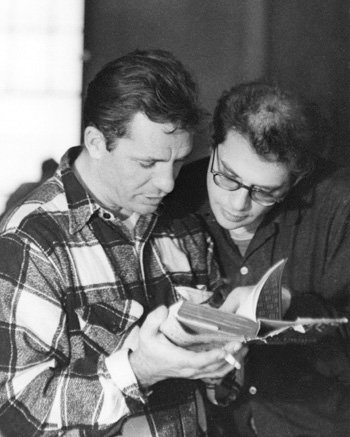
Alicia Freeman and LPP: What Does It Mean (in the Internship Space)?
“A person’s intentions to learn are engaged and the meaning of learning is configured through the process of becoming a full participant in a sociocultural practice” (29).
It took me quite some time to not be mad about having read the first chapter of Jean Lave and Etienne Wenger’s book, Situated Learning: Legitimate Peripheral Participation. I complained and complained about it to my boyfriend and made snarky notes in the book when I felt the same ideas were being repeated. Yet, after a few classes of discussion and general mulling over, plus my initial irrational anger dying down (a.k.a. finding something else to irrationally rage over), I started to see the benefit in it – especially in regards to my internship. Referencing the above quote which helps introduce Lave and Wenger’s theory on legitimate peripheral participation (LPP), it seems the mentor of my internship class focuses on helping her students learn by making them “full participant[s] in [the] sociocultural practice” of first-year composition.
Firstly, my mentor builds community among her students with the space, materials, and resources. I tie these together because when you step into class and see all the students in a semi-circle (or circle, depending on the day) with their laptops out and focusing on the task at hand, everything seems to go hand-in-hand. The formation of the desks encourage the students to create a community with each other and their teacher; in fact, because they can all easily access and see each other, they seem more comfortable to share their work. Furthermore, the mentor set up a shared Google Drive folder so the students can easily share with each other. It also teaches them how to organize their work. Since, as Rodby and Fox alluded to in their essay about the first-year composition classes, the workshop classes still do not award graduation credits, teaching organization (plus how to use Google Drive) offers the students additional worthwhile skills to help with their college career. By creating the shared folders and introducing them to the students, the mentor apprentices them in a way. She allows them to experiment with the resources Google Drive offers, while also helping them when necessary.
The relationships in the classroom, however, most remind me of what I interpret LPP to be: apprentices becoming part of a community by instruction from their mentors until, eventually, the apprentices become mentors themselves. The students in my internship may not choose to become writing workshop mentors, but by becoming immersed in the discourse community of university writing, they prove themselves capable to become academics. Being an awkward type, I felt anxious about entering the workshop space, but the mentor had such an air of kindness and tolerance that the stress faded. Further, the students themselves appeared at ease and part of the classroom community. The relaxed and accepting atmosphere of the classroom helps with this. As Lave and Wenger write, “learning is not merely situated in practice… learning is an integral part of generative social practice in the lived-in world” (35). Because the students feel comfortable socially in their classroom community (both with their teacher and each other), they are able to immerse themselves in the practice of first-year composition.
Moving to, finally, the mentoring itself, which sets all of these aspects into place. The space, materials, resources, and relationships – all, in a way, predicated by the mentor – “contribute inseparable aspects whose combinations create a landscape… of community membership” (35). The mentor set the stage for the workshop by first allowing her students to read an essay she’d written as a college freshman. By doing this she showed them that she once was a newcomer to academic writing too and needed to learn how to become a practiced member of the community. She also pushes her students to take ownership of their work and their constructive criticisms by letting them lead workshops (though with it being so early in the semester, the students are still getting used to the class and workshopping in general.) Yet, she also offers advice and pointers so the students know what they’re looking for in each other’s essays. She still acts as a guide, but because she also presents herself as a peer, she gives her students the confidence to experiment and improve their writing.
Overall, my internship seems to relish and thrive from learning in a community. Making the writing more social makes it also more accessible to the students – they seem to want to learn how to write better. Though Lave and Wenger want to avoid addressing LPP in the education sense – they treat it as a theory more than a prescriptive – their ideas about learning socially help make the internship class structure make sense. The social is important here because it creates trust and even compassion among the students; they want each other to do well while also striving to excel themselves. Plus, they see themselves as equals to their mentor, so they feel more comfortable making mistakes and learning from them.
One Reply to “Alicia Freeman and LPP: What Does It Mean (in the Internship Space)?”
Really interesting post! I’m glad I can get a peek into the mentoring internship since I’m working in the ESL Center. It’s great that you’re observing how the mentor is creating a rapport with the students in her class. I feel like this is one of the subtler aspects of teaching that sometimes goes overlooked or unappreciated. Can’t wait to hear more about the class!